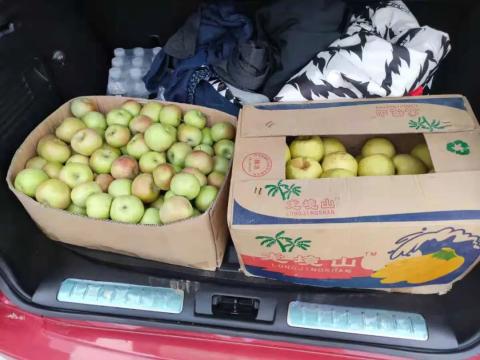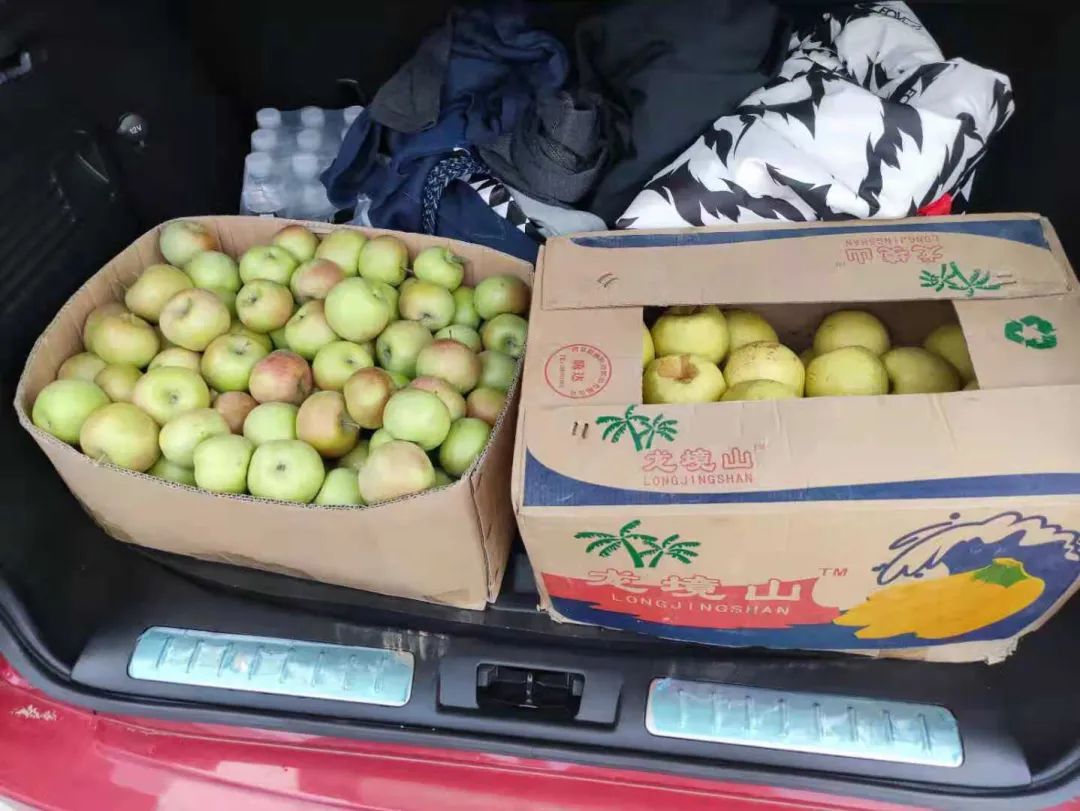
I will simply write down the story of my trip to visit ancient places in Shanxi during the National Day holiday. I will write about it wherever I go, with no particular theme.
Because this was my fifth trip to Shanxi to visit ancient times, the author, who thought he had a certain understanding of Shanxi’s customs, was careless – he didn’t check the weather carefully.
This time we took the classic archaeological route of Liang Sicheng and Lin Huiyin. It was already the morning of the 2nd when we drove from Suzhou to the vicinity of Mount Wutai. The weather was quite normal. We checked in at the famous Nanchan Temple and several surrounding ancient buildings.
The road is full of villages, large cornfields and orchards. I met a boy selling his own fruit. I bought a box each of pears and apples. I estimated that each box weighed at least 20 kilograms. The total cost was only 70 yuan. If this were in a first-tier city, one kilogram would cost at least a dozen yuan.

The boy was very excited when he saw our Jiangsu license plate and said that he would go to Xuzhou to go to college next week. The fruits we bought were probably the tuition fees for the boy's education.
If I pass by such a village again in the future, I will definitely try my best to buy some of their agricultural products. I hope that every college student who comes out of the village will at least not worry about tuition fees.
Saying goodbye to the boy selling fruit, I went to stay in a shabby guest house in the town of Wutai County. Don't ask me why I didn't book something better, because I went to Shanxi on a last-minute basis and couldn't book a decent hotel (there are no decent hotels in this county). Most of the tourists here are going to Mount Wutai as a pilgrim. There are so many people.
I checked the weather before going to bed. The forecast was that heavy rain would turn to light rain the next day (the 3rd), and it would be light rain for the next few days. Because I had experienced drizzle in Shanxi during the National Day period in the past few times, I was really careless.
When I woke up at 7 a.m. the next day, the 3rd, it was still dark and it was already raining heavily outside. The highest temperature outside was only 4 or 5 degrees Celsius, and it felt very cold. Fortunately, I brought winter clothes.
It was already 8:30 in the morning when we arrived at the famous Fo Guang Temple. Due to the heavy rain, it was almost pitch black inside the two main halls. It was impossible to see the murals and other things clearly using mobile phone lighting. The huge sound of rain was accompanied by the roar. There was thunder, but otherwise there was apocalyptic silence. The outside world seems to have nothing to do with this mountain.
Then when we went to the Princess Temple and the Secret Demon Temple, we couldn't see anyone else on the road, and there was no one else. The rain poured down like a river, which made people feel very scared.
Later, at Yanshan Temple and several surrounding ancient buildings, I met several tourists from Beijing who took the same route as me, but they all gave up on these two scenic spots on the mountain because the weather environment was too bad. Once mudslides and landslides occurred, the consequences would be serious. Unthinkable.
At that time, I naively thought that the rain would stop by the next day (the 4th).
I stayed in Dai County on the night of the 3rd. Due to the travel and fatigue in the previous period, coupled with the continuous rain, my body had already developed strong discomfort. I started to have a runny nose and cough. I guess I caught a cold. But I was still careless, thinking that drinking some hot water and sleeping would be enough.
Unexpectedly, the rain got heavier on the 4th, and the Bianjing Tower, which I had been thinking about so much, couldn't take any good-looking photos. The national security guard took a few pictures in a few places and left.
What impressed me more deeply was the Wu Temple we passed by. The old lady who was looking after the temple was offering incense to the huge statue in the heavy rain. I stood aside and watched quietly, silently watching each other, with only the sound of rain in my ears.
There was no one else in the temple, no one else in the alley outside the temple, and no young faces inside or outside the temple, just like other old places in Shanxi I visited.
The dirt road in Guangwu Ancient Town had been turned into mud by heavy rains. I didn’t get out of the car and lost interest in taking pictures, so I left in a hurry.
Friends who use navigation to go to Yingxian Wooden Pagoda must note that the end location of the navigation is a parking lot that needs to be walked five kilometers away from the scenic spot. The nearest parking and drop-off location should be the intersection of Yingbin North Road and Yingyuan Street, so remember this.
The area around the Pure Land Temple next to the wooden pagoda has been blocked by road construction, so it is probably inaccessible.
The Xuankong Temple also has its parking lot five kilometers away, and you need to take a shuttle bus. It is probably because the attraction came up with this idea to make money. If there is a driver, you can ask the driver to drive the car to the place closest to the ticket gate and drop the person off. It can be reached by walking about one kilometer.
There is a queue to go to the Xuankong Temple, with a limit of 150 people per hour. You may have to queue all day on holidays.
Yong'an Temple in Hunyuan County is famous for its murals, but in fact the murals are just that. The staff will sell you a mural album for 268 yuan along the way. Thin-skinned friends can give up on this attraction.
Most of the caves in Yungang Grottoes are under maintenance and cannot be entered. It also says that the estimated completion time for maintenance is July 1st this year. Maybe they need a new project manager to run it.
On the way back south from Datong, the rainstorm became heavier and heavier, which was simply outrageous.
There were constant car accidents and serious congestion on the highway, so I turned to the mountain road. Unexpectedly, the mountain road was also full of troubles.
Rocks continue to fall on the mountain, and many roads have large potholes, water accumulation, and even landslides.
The crop fields on the roadside have become the "Yellow River", and the corn stalks and big trees are soaked in the river, which is very sad.
I thought of the boy selling fruit and wondered what happened to his fruits and crops. I took a bite of his pears, which were sweet and juicy, but I felt clogged in my heart.
It was originally supposed to be a three- to four-hour drive, but due to the bad weather and mountain roads, we had to drive late into the night before we arrived at a small county town around Changzhi. We originally planned to visit Chongqing Temple, Faxing Temple, Tiantai Temple and Datong Temple the next day. Yunyuan.
I checked the Sifei applet on my phone and found out that Chongqing Temple and Faxing Temple were closed due to the weather. I was lucky and thought it would not be a pity that I could still visit Tiantai Temple.
I felt severe physical discomfort. I no longer had a cough or runny nose, but I had a feeling similar to altitude sickness. I had a headache, my limbs were weak, and I couldn't see a doctor. I could only stay stiff.
On the 6th of the next day, I set out early in the morning and arrived at a place only three or four kilometers away from Tiantai Temple. The traffic police blocked the way and said that the mountain road was flooded due to the release of water from the reservoir on the mountain.
"Go back to the hotel." The traffic policeman said.




The area where the floodwaters were located was originally a cornfield.
At this time, the floodwater was about to overflow the roadside, so we had no choice but to turn around and go back the way we came.
In fact, I am quite worried about the traffic policemen who maintain order. Their situation is actually very dangerous. I hope they can all retreat safely.
At the same time, I saw the news on the news that four Shanxi traffic policemen were killed in a landslide during heavy rains. I felt very heartbroken and helpless.
I hurriedly got on the expressway, left Shanxi, and started home. I checked the news along the way and saw that the roads I had traveled on, whether it was expressways or mountain roads, were blocked one by one. I was lucky to be able to get out in time.
But it makes me sad to think that many local people are suffering from the disaster. Along the way, I saw cave dwellings collapsed, all crop fields destroyed, countless houses washed away by floods, not to mention countless roads and bridges washed away.
I write this article in the hope that everyone will pay more attention to the disaster in Shanxi. What gives us warmth in winter is our hometown here.
At this time, I have returned home to Suzhou, and I need some time to rest. Maybe the mobile phone reply may not be timely recently, so please forgive me.
